
Charlsie Cantey: A Pioneer in Horse Racing Media
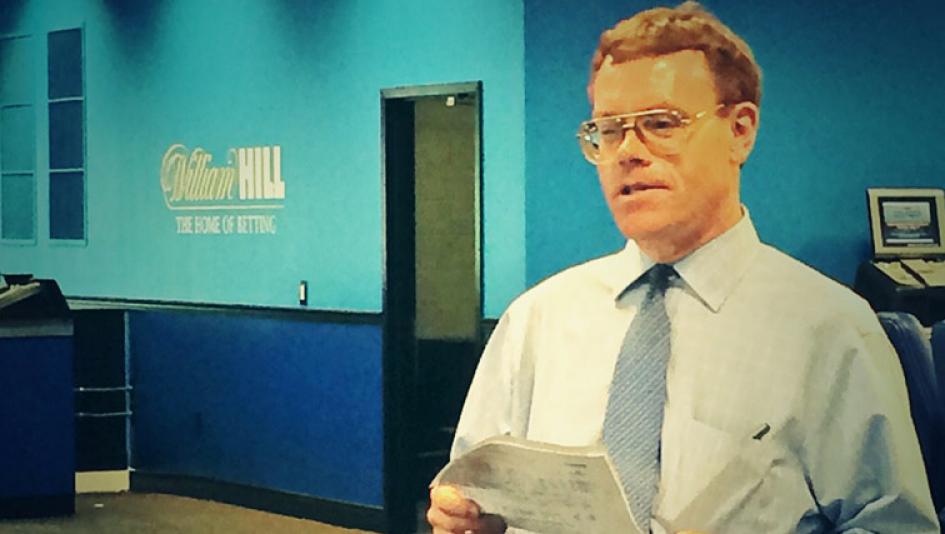
Being a public handicapper, especially one who is on TV, requires thick skin.
Think about it: when the analysts predicting races on TV are right, most people think, “that’s what they’re paid to do, get it right!” And when they’re wrong? Oh, you can only imagine the kind of emails, Tweets and other messages some handicappers have to deal with from unhappy bettors.
Somehow, in 35 years as a TV analyst and handicapper, mostly at Monmouth Park, Brad Thomas has managed to stay above the fray.
Aside from being a staple on the New Jersey racing scene for more than three decades, Thomas has also gained national recognition from handicappers across the country for his ability to pick longshot winners. In 1999 for the Belmont Stakes, Thomas touted a straight $5,343 trifecta that included Lemon Drop Kid at 29.75-to-1 on top, followed by Vision and Verse at 54.75-to-1. Over the years, many knowledgeable horse players have said that Thomas is simply the best in the business.
So, with the dawn of a new spring-summer race meet at Monmouth Park upon us - the meet runs from May 10-Sept. 28 - we decided to sit down with the Thomas for an in-depth Q&A.
Thomas discusses everything from his eclectic approach to handicapping, tips for new players and some of his biggest scores. He even explains why he thinks California Chrome won’t win the Triple Crown. Thomas is a wealth of information and you can follow him on Twitter on @BradShadesOff.
Dan Tordjman: Brad, would you start off with a little about yourself, where you grew up and how you got into racing?
Brad Thomas: I grew up in Central Jersey. I’ve been coming to Monmouth Park since the 1960s, which, of course, dates me somewhat. Growing up, I was involved with a vast variety of sports ... couldn’t play any of them except, of course, horse racing. So, I think that’s probably why I gravitated more toward it. I’m very analytical in the way I think. I like military history, and I think about that analytically. I think there are parallels. Maybe even more of a parallel is my evolving viewpoint of what horse racing is. To me, it’s not a sport at all - it’s a game. It has sport aspects ... but it has all sorts of other compartments, as well. So, I prefer to give it a more generic name, like “game.”
WILLIAM HILL SPORTS RACE & SPORTS BOOK AT MONMOUTH
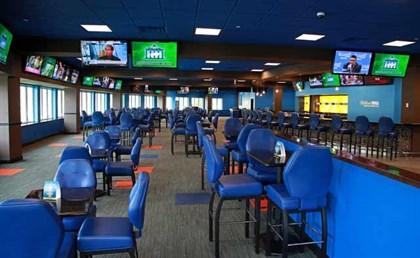
Photo by Bill Devner/EQUI-PHOTO
TORDJMAN: A lot of us get into the “game” through a parent, other relative or friend, and we might want to turn it into a career because it is so much fun. How did you transition from being a fan to turning that into a career?
THOMAS: I’m analytical and I like to write. I was able to parlay those two together and get opportunities to write about racing early in my career. As I wrote, I learned more about racing and I had a chance to see that there are all sorts of niche careers available for someone who had maybe different perspectives on a lot of different things. Racing is the kind of game that rewards contrarians, whether they’re gamblers, whether they’re people picking out horses at sales or whether they’re people picking up-and-coming trainers to train their horses. So, it really was just a good fit on a variety of different levels.
TORDJMAN: How did you end up working (as a TV analyst and handicapper) at Monmouth Park?
THOMAS: I did television at the Meadowlands at the dawn of the television era for horse racing. It was the early 1980s. Before that time, you would see the races on television monitors at the track but there were never people talking about them or analyzing them. But in the early 80s that began to change. As the television aspect of things began to develop, I continued to improve upon my ability to convey my thoughts on video and eventually a job opened up at Monmouth Park, and I was able to work there, as well.
TORDJMAN: What is it like for you to be here at Monmouth every summer? Describe the atmosphere for someone who maybe hasn’t been here before.
THOMAS: Well, I was at Saratoga for every single racing day for about 10 years and it’s wonderful and special — there’s no doubt about that. But I truly believe that Monmouth has all of the charm of Saratoga, with a lot more of the quaintness. I work here every day, but if I could go to a racetrack just one more time in my life, it would be at Monmouth Park. Not just for the sentimental aspects but because of all of the other aspects, as well. The grounds are absolutely gorgeous. The track has its own historical look to it. It just has everything I would want in a racetrack.
TORDJMAN: What should people know about handicapping races at Monmouth Park?
THOMAS: What I would say is to really get a feel for trainers in an individual year who are live. One thing we see at Monmouth Park is that there’s always three or four trainers who sometimes just come right out of the blue and dominate the meet - if not in actual numbers of wins, then in terms of horses that win at very good prices a high percentage of the time. That really could get your meet off to a good start and get your frame of mind off to a good start in analyzing what happens in the future. The other thing would be watch how the track plays from the beginning of the meet. A few years ago, we had outside closers do very well on this track. The last couple of years, we’ve had inside speed do very well.
HORSES GALLOP AT MONMOUTH
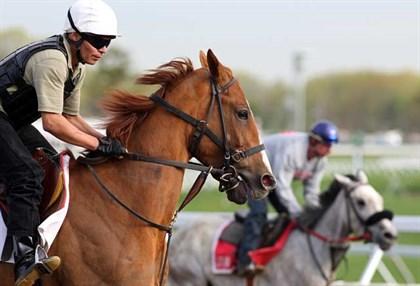
Photo by Bill Devner/EQUI-PHOTO
TORDJMAN: If you had to describe your overall approach to handicapping, are you a pace guy, a trip guy, or is there any one variable that influences most of your decisions?
THOMAS: Well, I’m cursed (smiles). I’m badly cursed because I’m eclectic. When you’re eclectic, that means you have to do too much work because you’re covering far too many things. The hard part, and the fun part at the same time, is being able to select the most important mix of variables or combination of variables for a given circumstance. Of course, you have to have those variables at hand. You have to have compiled them. There are some - like savants - who don’t have to do any preparation and are still really good handicappers. I’m not one of them, so I’m doubly cursed. I have to accumulate all the information in very painstaking fashion and then I have to torment myself by twisting it all around in the deepest, dankest and hopefully fertile regions of my sick mind. You put it all together and it makes sense. Of course, sometimes it doesn’t. You have to be comfortable losing in this game. My style is that I don’t mind losing a lot, but when I win I expect to win a lot and to compensate myself for a plethora of mistakes that I’m more than capable of making. I’m not good enough to pick favorites and do well - I can’t pick a high-enough percentage of them. I have to look for horses whose odds are far higher than what I think their chances are, and hopefully I can find enough of them to do reasonably well.
TORDJMAN: To that end, we do have a Twitter question from @jkearns33168. He says, “Seriously, ask him how much time he spends a week handicapping. My over under is 100 hours. Guy is brilliant.”
THOMAS: Well, the former of what he said is probably true, the latter is most certainly not (laughs). If I was brilliant, I wouldn’t have to spend that much time, believe me. No, I don’t actually count the hours because I’d probably drop dead of fright if I actually did. My day starts very early in the morning and frequently I’m at work at the top of a garbage can at the train station, when it’s still dark out. That’s my desk, the top of a garbage can at the train station.
TORDJMAN: Seriously though, some public handicappers are very polarizing. Some are either loved or hated but it does seem like people really do gravitate toward you and speak about you in an overwhelmingly positive light.
THOMAS: There’s a lot of people who really hate me actually, too. I think the people who don’t like me have trouble with the fact that I’m not trying to pick winners. I’m not trying to pick them because I don’t think that’s what the game is. The game is about finding value and if you find value consistently, there will be enough winners in the long run. To me, it’s all about disparity between return and true chances of winning. The people who like me, bless them. I adore them back and I most appreciate them. I would hope that the reason why they feel positively about me is because I do put my best effort out every day. I never mail it in. That’s maybe the proudest thing I can ever say. I may do a bad job but it’s never from lack of trying.
TORDJMAN AND THOMAS
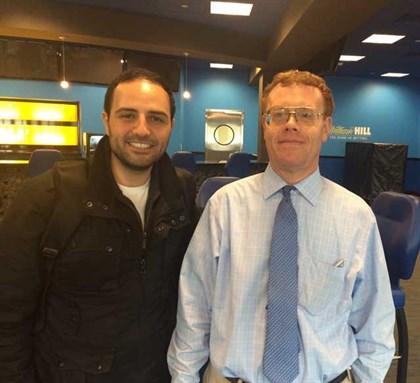
Photo by Dan Tordjman
TORDJMAN: It’s well known that you’ve had some major calls in your career (last year, Thomas called a cold exacta in the Kentucky Derby that paid more than $981.60 for $2 and this year touted longshot Kentucky Derby runner-up Commanding Curve). What is your proudest call as a handicapper?
THOMAS: It was a horse at the Meadowlands about 30 years ago when I was first starting out. His name was Rye at Sea. This was a horse from Maryland who I had really been paying attention to and he came to the Meadowlands for a stakes race (I actually looked it up and found that the race was the Palisades Handicap on November 6, 1980) at some astronomical price, 50-to-1 or 60-to-1, it could have been less. He actually ran a great race and finished second but through a disqualification was placed first. There was, of course, monstrous luck involved in that, but the ultimate lesson in that was if you have an opinion, it makes sense to play it. Because even if you lose at those odds, so what? You’re going to have plenty of other chances in your win zone at 50- or 60-to-1 and if you take a shot, good things can happen. It’s kind of the D. Wayne Lukas philosophy of entering horses in big races: You’ve gotta be in it to win it.
TORDJMAN: What are your thoughts on California Chrome?
THOMAS: I think he has a great shot of winning the Preakness. He won’t win the Belmont. The Triple Crown has a way of [keeping] horses who are not Triple Crown-worthy from winning … and that’s no knock on them, they can still be tremendous horses. California Chrome is super consistent, super-great foundation. I love the way he’s been prepared, but I don’t see him accelerating like he accelerates at a mile and a quarter, going a mile and half on “Big Sandy” (the nickname for Belmont Park’s main track) around those sweeping turns and holding on. It’s not going to happen.
CALIFORNIA CHROME
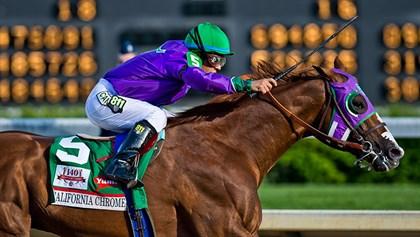
Photo by Eclipse Sportswire
TORDJMAN: Lastly, are there any horses that not many people are talking about that you see as having a lot of upside in any of the divisions?
THOMAS: I have a book full of notes on tons of horses like a football scout might have of high school and college prospects. Truly, that’s how I work because I’m a big believer that you’re looking for talent and developing talent and you have visions into these horses and how they might develop. ... The unfortunate thing is that I’m so focused on all of these things that I might have 20 horses I like but I couldn’t tell you their names off the top of my head. I’ll tell you this, Tonalist, who is running in the Peter Pan at Belmont on Saturday, may not be cranked for his A+ game in the Peter Pan. But he, to me, is a horse with as much talent in the 3-year-old division, off what I’ve seen. His running style, stride and pedigree say he is a classic-distance kind of horse. Whether the Belmont is a fit for him at this stage, I don’t know. But he’s certainly one for the Travers and for the fall races.